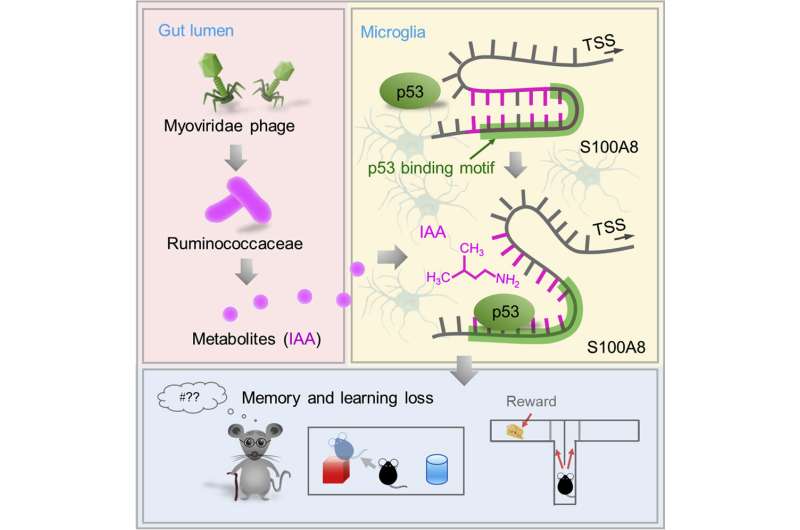Graphical abstract. Credit: Cell Host & Microbe (2022). DOI: 10.1016/j.chom.2022.05.005
A team of researchers from the Brown Cancer Center, the University of Louisville, Peak Neuromonitoring Associates, the University of Texas and the University of Louisville has found that a metabolite produced by bacteria in the gut promotes neural cell death resulting in cognitive decline in mice. In their paper published in the journal Cell Host & Microbe, the group describes their study of the metabolite isoamylamine (IAA) and its impact on cognitive decline.
Prior research has suggested a strong link between gut bacteria and brain health. In this new effort, the researchers looked into the possible impact on the brain of just one metabolite produced by one family of bacteria in the gut, Ruminococcaceae.
They found first that IAA becomes more prevalent in the gut as people age due to the presence of more Ruminococcaceae. Their interest in IAA grew when they learned it could pass through the blood-brain barrier. In order to trace the path of IAA from the gut into the brain to see what impact it might have, they had to develop a new technique—a modification of electrophoresis that allowed for the tracking of DNA mobility shifts—which they called single-strand gel shift. They next incubated the gene responsible for sensing and responding to aging in mice (S100A8) with IAA. They found the metabolite binds to a promoter region of S100A8, which allowed for expression of the gene, resulting in production of apoptotic bodies, which lead to cell death.
To learn more about what happens when such bindings occur, the researchers fed IAA to young healthy mice and determined that this resulted in a loss of cognitive function. They next blocked production of the metabolite in the guts of older mice and found that it led to improvements in cognitive performance.
They state more research needs to be done to find out if the production of IAA in the human gut biome also results in cognitive decline, and if so, whether blocking its production would prevent cognitive decline as people age.
More information: Yun Teng et al, Gut bacterial isoamylamine promotes age-related cognitive dysfunction by promoting microglial cell death, Cell Host & Microbe (2022). DOI: 10.1016/j.chom.2022.05.005
Journal information: Cell Host & Microbe
© 2022 Science X Network
























